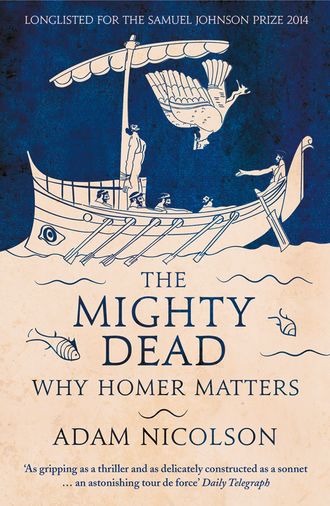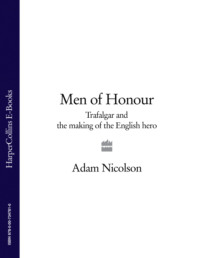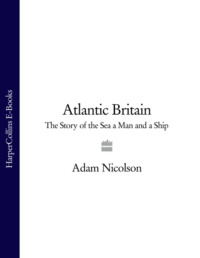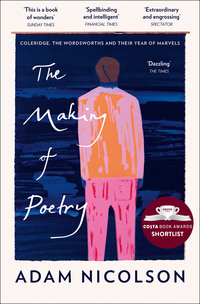
Полная версия
The Mighty Dead: Why Homer Matters
The difficulty and strangeness of the Greek was little more than a prison of obscurity to me, happily abandoned once the exam was done. Homer stayed irrelevant.
Now I had Fagles’s words in front of me. Half idly, I had brought his translation of the Odyssey with me on the Auk, as something I thought I might look at on my own sailing journey in the North Atlantic. But as I read, a man in the middle of his life, I suddenly saw that this was not a poem about then and there, but now and here. The poem describes the inner geography of those who hear it. Every aspect of it is grand metaphor. Odysseus is not sailing on the Mediterranean but through the fears and desires of a man’s life. The gods are not distant creators but elements within us: their careless pitilessness, their flaky and transient interests, their indifference, their casual selfishness, their deceit, their earth-shaking footfalls.
I read Fagles that evening, and on again as we sailed up the west coast of Ireland. I began to see Homer as a guide to life, even as a kind of scripture. The sea in the Odyssey was out to kill you – at one point Hermes, the presiding genius of Odysseus’s life, says, ‘Who would want to cross the unspeakable vastness of the sea? There are not even any cities there’ – but hidden within it were all kinds of delicious islands, filled with undreamt-of delights, lovely girls and beautiful fruits, beautiful landscapes where you didn’t have to work, dream lands, each in their different way seducing and threatening the man who chanced on them. But every one was bad for him. Calypso, a goddess, unbelievably beautiful, makes him sleep with her night after night, for seven years; Circe feeds him delicious dinners for a whole year, until finally one of his men asks him what he thinks he is doing. If he goes on like this, none of them will ever see their homes again. And is that what he wants?
In part I saw the Odyssey as the story of a man who was sailing through his own death: the sea is deathly, the islands are deathly, he visits Hades at the very centre of the poem and he is thought dead by the people who love him at home, a pile of white bones rotting on some distant shore. He longs for life and yet he cannot find it. When he hears stories told of his own past, he cannot bear it, wraps his head in his ‘sea-blue’ cloak and weeps for everything he has lost.
It was Odysseus I really fell in love with that summer as we sailed north to the Hebrides, Orkney and the Faroes: the many-wayed, flickering, crafty man, ‘the man of twists and turns’ as Fagles calls him, translating the Greek word polytropos, the man driven off course, the man who suffered many pains, the man who was heartsick on the open sea. His life itself was a twisting, and maybe, I thought, that was his destiny: he could never emerge into the plain calm of a resolution. The islands in his journey were his own failings. Home, Ithaca, was the longed-for moment when his own failings would at last be overcome. Odysseus’s muddle was his beauty.
He is no victim. He suffers but he does not buckle. His virtue is his elasticity, his rubber vigour. If he is pushed, he bends, but he bends back, and that half-giving strength was to me a beautiful model for a man. He was all navigation, subtlety, invention, dodging the rocks, story-telling, cheating and survival. He can be resolute, fierce and destructive when need be, and clever, funny and loving when need be. There is no need to choose between these qualities; Odysseus makes them all available.
Like Shakespeare and the Bible, we all know his stories in advance, but there was one in particular which struck me that summer sailing on the Auk. We had left the Arans late the evening before, and George had taken her all night up the dark of the Galway coast. We changed at dawn, and in that early morning, with a cup of tea in my hand at the wheel, and the sun rising over the Irish mainland, I took her on north, heading for the Inishkeas and the corner of County Mayo, before turning there and making for Scotland.
The wind was a big easterly, coming in gusts over the Mayo hills, the sun white and heatless. George, and my son Ben who had joined us, were asleep below. There were shearwaters cruising the swells beside us, black, liquid, effortless birds, like the sea turned aerial, and a fulmar now and then hung in the slot between the headsail and the main, flying with us on the current of air. The Auk surged on the wind that morning, heeling out into the Atlantic, churning her way north, horse-like in her strength. I don’t know when I have felt so happy.
Steering across the swells, holding the wheel against them as they came through, releasing it as they fell away, I propped the great Robert Fagles translation of the Odyssey against the compass binnacle, tying it open with a bungee cord in the wind, and absorbed his words. That morning I read the story of the Sirens. Just as we do, Odysseus knew he would be exposed to the songs which the strange, birdlike creatures sang to mariners and with which they lured passing ships on to the shore, wrecking them there and then leaving the men to linger until they died.fn1 The only way Odysseus could get past the Sirens was to cut up a round cake of beeswax, knead it in his hands, softening the wax in the heat of the sun, and then press plugs of it into the ears of the sailors. Once they were deafened, he had himself lashed to the mainmast, so that any desire he might have to steer towards the delicious honeyed voices could have no effect on his men. Only if he were powerless could he listen to them singing from their meadow, as Robert Fagles translated it, ‘starred with flowers’.
That meadow of death is the most desirable place any man could imagine. It is yet another island into which a man might long to sink and die. A dead calm falls on the sea. The men brail up the sail and then sit to their oars. The Sirens, just within shouting distance of the ship, taunt Odysseus as he passes. They can give him wisdom if he will come to them and listen. If he will let them, they will make him understand. They press on him the comfort and beauty of what they have to offer. They sing to him and Odysseus longs for them, his heart throbbing for them, as Fagles says, and with his eyebrows gestures to the crew to set him free. But the crew won’t respond. Deaf to all persuasion, they bind him tighter and row the ship through and past.

Odysseus, bound to the mast of his ship, its mainsail brailed up, resists the seduction of the Sirens’ song. From a stamnos, or storage jar, made in Athens in about 480 BC but exported to the Etruscan city of Vulci, on the Mediterranean shore sixty miles north of Rome, where it was excavated in the nineteenth century. It is now in the British Museum, which bought it in 1848 from its collector, one of Napoleon’s daughters-in-law.
Never is Homer more rapid. Like Odysseus’s ‘sea-swift’ ship, the whole scene sweeps past in forty lines. Rarely can something so brief have spread its ripples so wide. But the point is this: the song the Sirens sing is not any old crooning seduction tune. It is the story of the Iliad itself.
We know all the pains that the Greeks and Trojans once endured
On the spreading plain of Troy when the gods willed it so –
All that comes to pass on the fertile earth, we know it all.
The Sirens sing the song of the heroic past. That is the meadow of death. They want to draw Odysseus in with tempting stories of what he once was. And Odysseus, after his years of suffering and journeying, of frustration in the beautiful arms of Calypso, whose name means ‘the hidden one’, the goddess of oblivion, longs to return to the active world, the world of simplicity and straightforwardness he had known at Troy. The Sirens are wise to that: they know the longing in his heart. The prospect of clear-cut heroism summons him and he struggles to escape his bindings. But his men, like the poem itself, know better, and they tie him tighter to his ship. They won’t be wrecked on the illusions of nostalgia, on the longing for that heroised, antique world, because, as the Odyssey knows, to live well in the world, nostalgia must be resisted: you must stay with your ship, stay tied to the present, remain mobile, keep adjusting the rig, work with the swells, watch for a wind-shift, watch as the boom swings over, engage, in other words, with the muddle and duplicity and difficulty of life. Don’t be tempted into the lovely simplicities that the heroic past seems to offer. That is what Homer, and the Sirens and Robert Fagles all said to me that day.
I can still see the sunlight coming sheening off the backs of the swells that morning, as they made their way past and under me, combed and slicked with the sea-froth running down them, every swell the memory of storms in the Atlantic far to the west, steepening to the east and then ruining themselves ashore. The Auk sailed north with the shearwaters and the morning became unforgettable. It was when this book began.
I thank God I met Homer again that summer. He was suddenly alongside me, a companion and an ally, the most truly reliable voice I had ever known. It was like discovering poetry itself, or the dead speaking. As I read and reread the Odyssey in translation, I suddenly felt that here was the unaffected truth, here was someone speaking about fate and the human condition in ways that other people only seem to approach obliquely; and that directness, that sense of nothing between me and the source, is what gripped me. I felt like asking, ‘Why has no one told me about this before?’
The more I looked at the poems in different translations, and the more I tried to piece bits of them together in the Greek with a dictionary, the more I felt Homer was a guidebook to life. Here was a form of consciousness that understood fallibility and self-indulgence and vanity, and despite that knowledge didn’t surrender hope of nobility and integrity and doing the right thing. Before I read Pope’s Preface to the Iliad, or Matthew Arnold’s famous lectures on translating Homer, I knew that this was the human spirit on fire, rapidity itself, running, going and endlessly able to throw off little sidelights like the sparks thrown off by the wheels of an engine hammering through the night. Speed, scale, violence, threat; but every spark with humanity in it.
TWO
Grasping Homer

PARIS, 11 MAY 1863, Le Repas Magny, a small restaurant up a cobbled street on the Left Bank in the Sixième. Brilliant, literary, sceptical Paris had gathered, as usual, for its fortnightly dinner. The stars were there: the critic and historian Charles Sainte-Beuve; the multi-talented and widely admired playwright and novelist Théophile Gautier; the unconscionably fat Breton philosopher, the most brilliant cultural analyst of the nineteenth century, Ernest Renan; the idealistic and rather intense Comte de Saint-Victor, a minor poet and upholder of traditional values; and observing them all the supremely waspish Jules de Goncourt, with his brother Edmond.

Magny’s restaurant stood at the head of the rue Contrescarpe-Dauphine on the Left Bank in Paris.
The Magny dinners, every other Monday, were ten francs a head, the food ‘mediocre’ apparently, everyone shouting their heads off, smoking for France, coming and going as they felt like it, the only place in Paris, it was said, where there was freedom to speak and think. Jules de Goncourt transcribed it all.
‘Beauty is always simple,’ the Comte de Saint-Victor said as the waiters brought in the wine. He had a way, when saying something he thought important, of putting his face in the air like an ostrich laying an egg. ‘There is nothing more beautiful than the feelings of Homer’s characters. They are still fresh and youthful. Their beauty is their simplicity.’
‘Oh for Christ’s sake,’ Edmond groaned, looking over at his brother. ‘Must we? Homer, again?’
Saint-Victor paused a moment, went white and then very deep red like some kind of mechanical toy. ‘Are you feeling well?’ Goncourt said to him across the table. ‘It looks as if Homer might be playing havoc with your circulation.’
‘How can you say that? Homer, how can I put it … Homer … Homer is … so bottomless!’ Everyone laughed.
‘Most people read Homer in those stupid eighteenth-century translations,’ Gautier said calmly. ‘They make him sound like Marie-Antoinette nibbling biscuits in the Tuileries. But if you read him in Greek you can see he’s a monster, his people are monsters. The whole thing is like a dinner party for barbarians. They eat with their fingers. They put mud in their hair when they are upset. They spend half the time painting themselves.’
‘Any modern novel,’ Edmond said, ‘is more moving than Homer.’
‘What?’ Saint-Victor screamed at him across the table, banging his little fist against his head so that his curls shook.
‘Yes, Adolphe, that lovely sentimental love story by Benjamin Constant, the sweet way they all behave to each other, his charming little obsession with her, the way she doesn’t admit she wants to go bed with him, the lust boiling away between her thighs, all of that is more moving than Homer, actually more interesting than anything in Homer.’
‘Dear God alive,’ Saint-Victor shrieked. ‘It’s enough to make a man want to throw himself out of the window.’ His eyes were standing out of his head like a pair of toffee-apples.
‘That would be original,’ Edmond said. ‘I can see it now: “Poet skewers himself on street-lamp because someone said something horrid about Homer.” Do go on. It would be more diverting than anything that has happened for weeks.’
Chairs were shoved back from the table, somebody knocked over a bottle of wine, the waiter was standing ghoul-faced at the door, Saint-Victor was stamping and roaring like a baby bull in his own toy bullring, as red in the face as if somebody had said his father was a butcher and his mother a tart. Everyone was bellowing.
‘I wouldn’t care if all the Greeks were dead!’
‘If only they were!’
‘But Homer is divine.’
‘He has got nothing to teach us!’
‘He’s just a novelist who never learned how to write a novel.’
‘He says the same thing over and over again.’
‘But isn’t it deeply moving,’ Saint-Victor said imploringly, ‘when Odysseus’s dog wags the last sad final wag of his tail?’
‘You can always tell a bully,’ Edmond said quietly to his brother. ‘He loves dogs more than their owners.’
‘Homer, Homer,’ Sainte-Beuve was murmuring through the uproar.
‘Isn’t it strange,’ Jules said to Renan afterwards. ‘You can argue about the Pope, say that God doesn’t exist, question anything, attack heaven, the Church, the Holy Sacrament, anything except Homer.’
‘Yes,’ Renan said. ‘Literary religions are where you find the real fanatics.’
Homer loomed up again at another Magny dinner the following October. They were talking about God, whether God was definable or even knowable. Renan ended up by comparing God, his particular God, in all possible piety and seriousness, to an oyster. Uniquely itself, beautifully self-sufficient, not entirely to be understood, mysteriously attractive, mysteriously unattractive, wholly wonderful: what was not Godlike about the oyster? Rolling laughter swept up and down the table.
That was when Homer emerged. To the Goncourts’ horror, these modern, sceptical destroyers of faith, the most fearless critics of God that France had ever known, burst into a song of Homeric praise which made the brothers retch. The diners at le Repas Magny might have been partisans of progress, but all agreed that there was a time and a country, at the beginning of humanity, when a work was written in which everything was divine, above all discussion and even all examination. They began to swoon with admiration over individual phrases.
‘The long-tailed birds!’ [Hippolyte] Taine, [the philosopher and historian] cried out enthusiastically.
‘The unharvestable sea!’ exclaimed Sainte-Beuve, raising his little voice. ‘A sea where there are no grapes! What could be more beautiful than that?’
‘Unharvestable sea?’ What on earth did that mean? Renan thought some Germans had discovered a hidden significance in it. ‘And what is that?’ asked Sainte-Beuve.
‘I can’t remember,’ Renan replied, ‘but it’s wonderful.’
The Goncourt brothers sat back, regarding this mass expression of Homer-love with their habitual, jaundiced eye.
‘Well, what do you have to say, you over there,’ Taine called out, addressing them, ‘you who wrote that antiquity was created to be the daily bread of schoolmasters?’
So far the brothers had said nothing, and had let the Homer-hosannas go swirling around the dining room without comment, but now Jules said: ‘Oh, you know, we think [Victor] Hugo has more talent than Homer.’
It was blasphemy. Saint-Victor sat as upright as a fence-post and then went wild with rage, shouting like a madman and shrieking in his tinny voice, saying that remarks like that were impossible to stomach, they were too much, insulting the religion of all intelligent people, that everybody admired Homer and that without him Hugo would not even exist. Hugo greater than Homer! What did the Goncourts know? What idiot novels had they been producing recently? He shouted and screamed, dancing up and down the room like an electrified marionette. The Goncourts shouted back, increasingly loudly, raging at the little supercilious poet, who for some reason thought he was more in touch with the meaning of things than they ever could be, sneering at them down his peaky red nose, while they could feel nothing but contempt for the man they would think of forever after as the nasty stuck-up little self-congratulatory Homer-lover.
* * *
These conversations seem as distant as the Bronze Age. Where now is our violence on behalf of a poet? Who feels this much about Homer? The Goncourts, with their scepticism and their modernism, their contempt for antiquity, have won the day. Their prediction has come more than true: the ancient world is now the daily bread not of schoolmasters but of academics. Everyone has heard of Homer, probably of the two poems, and many have read some passages; but no one today ends up shouting at dinner about him. Mention Homer across a table and a kind of anxiety comes into the face you are looking at, a sort of shame, perhaps a fear of seeming stupid and ignorant. Almost no one loves the poems he wrote, or the phrases that recur in them.
Why should they? The place of Homer in our culture has largely withered away. I can only say that, for me, the growing experience of knowing Homer, of living with him in my life, has provided a kind of ballast. He is like a beautiful stone, monumentally present, a paternal foundation, large, slightly ill-defined, male and reliable. He is not a friend, a lover or a wife; far more of an underlayer than that, a form of reassurance that in the end there is some kind of understanding in the world. Goethe thought that if only Europe had considered Homer and not the books of the Bible as its holy scripture, the whole of history would have been different, and better.
That quality does not exist in some floating metaphysical outer sphere. It is precisely in the words he uses, and it is on that level that something like ‘the unharvestable sea’ is a beautiful expression. It is the twin and opposite of another of Homer’s repeated, metrically convenient, perfect and formulaic phrases, ‘the grain-giving earth’. And why is it beautiful? Because it encapsulates the sensation of standing on a beach and looking out at the breaking surf, and seeing in it the unforgiving brutality of the salt desert before you. Everything you are not stares back at what you are. It is a phrase which knows that, as you are looking out at that hostility, behind you, at your back, are all the riches that the earth might give, the olive and the grape, the security of home, the smell of cut hay, the barn filled with the harvested wheat and barley, the threshed grains, the sacks tight with them in the granaries, the ground flour, the bread at breakfast, the honey and oil. ‘The unharvestable sea’ – two words in Greek, pontos atrygetos – is a form of concentrated wisdom about the condition of life on earth. It states the obvious, but also provides a kind of access to reality, both painful and revelatory. All Homer is in the phrase.
Those words occur many times in both the Iliad and the Odyssey, often poignantly. Almost at the beginning of the Odyssey Odysseus’s son Telemachus, at the end of twenty years’ waiting for his father to return, first from the war against Troy and then from his vastly extended and troubled journey home across the sea, has decided to go in search of him, to ask in the mainland of Greece, in Pylos and Sparta, if there is any news of the man most people now consider dead.
Homer, over the course of thirty-five lines, prepares the ground for the climactic words. Telemachus needs to get ready for his journey, and to do so he goes down into his father’s treasure chamber in the palace in Ithaca, his thalamos. Upstairs, all is anarchy and chaos. The young men who are living in the palace, clamouring to marry Telemachus’s mother Penelope, are eating up the goods of the household. But down here, like a treasury of the past, of how things were before Odysseus left for the wars half a lifetime ago, all is order and richness. Clothes, gold and bronze are piled in the chamber, but also sweet-smelling oils, wine, which is also old and sweet, all lined up in order against the walls. All the accumulated goodness of the land is in there. Telemachus, whose name means ‘far from battle’,fn1 meets an old woman, Eurycleia, down here. She was his nurse as a child, feeding and raising him. Now that he is a man, she tends and protects these precious fruits of the earth. He asks her for the best wine to be poured out for him into small travelling jars, and for milled barley to be put into leather sacks. He must take the earth’s goods out on to the sea.
But Eurycleia – and the name of this private nurse, this tender of things, means ‘wide-fame’ – dreads Telemachus going where his father has gone to die. A wail of grief breaks from her when he tells her his plans, and she suddenly addresses him as she had years before:
Ah dear child, how has this thought come into your mind?
Where do you intend to go over the wide earth,
you who are an only son and so deeply loved?
Odysseus is dead, has died far from home in a strange land.
No, stay here, in charge of what is yours.
You have no need to suffer pain
or go wandering on the unharvestable sea.
Nothing could be clearer: the unharvestable sea is not to be visited. It is the realm of death. When Odysseus does finally come home (and Eurycleia plays a key role in that return), Homer has a one-word synonym for the sea: evil. The word she uses here for ‘wandering’ is also dense with implication: alaomai is used of seamen, but also of beggars and the unhomed dead. The unharvestable sea is where life and goodness will never be found. Everything Eurycleia has devoted her life to, the nurturing and cherishing of the goodness of home, has been the harvest of an unwandering life. The man standing in front of her is one of those fruits. The unharvestable sea is a kind of hell, and in that phrase the drama of his life, her life, Odysseus’s life, the life and death of those Ithacans who have not returned from Troy, of Penelope weaving and unweaving the cloth that will not be woven until Odysseus returns: all of it is bound up in pontos atrygetos.







